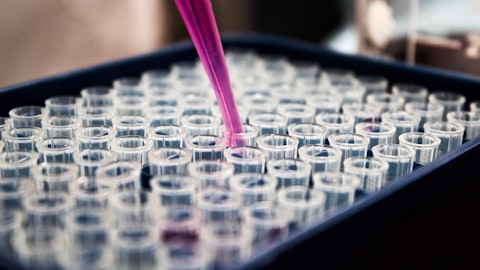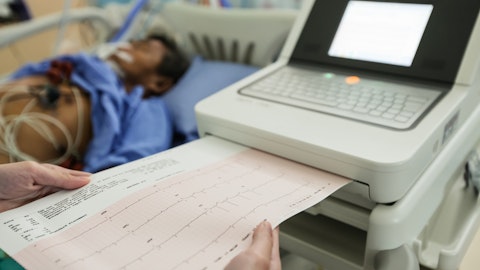Helius Medical Technologies, Inc. (NASDAQ:HSDT) Q4 2022 Earnings Call Transcript March 10, 2023
Operator: Good day, and thank you for standing by. Welcome to the Helius Medical Technologies Fourth Quarter and Year-End 2022 Earnings Conference Call. As a reminder, today’s conference may be recorded. I’d now like to hand the call over to your speaker, Michelle Bilski, Investor Relations. Please go ahead.
Michelle Bilski: Thank you, operator. Welcome to the fourth quarter and year-end 2022 Earnings Conference Call for Helius Medical Technologies. This is Michelle Bilski of In-Site Communications, Investor Relations for Helius. With me on today’s call are Dane Andreeff, Helius Medical’s President and Chief Executive Officer; and Jeff Mathiesen, Chief Financial Officer. Also on the call today is Dr. Antonella Favit-Van Pelt, Helius Medical’s Chief Medical Officer, who will be available as needed during Q&A. At this time, all participants have been placed in a listen-only mode. Please note that this call is being recorded, and access to the webcast can be obtained through the Investors section of Helius website at www.heliusmedical.com.
Before we begin, I would like to remind everyone that our remarks and responses to your questions today may contain forward-looking statements that are based on the current expectations of management. These forward-looking statements involve inherent risks and uncertainties that could cause actual results to differ materially from those indicated, including those identified in the Risk Factors section of our most recent annual report on Form 10-K and quarterly reports on Form 10-Q. Such factors may be updated from time to time in our other filings with the SEC, which are available on our website. All statements made during this call are as of March 9, 2023. We undertake no obligation to publicly update or revise our forward-looking statements as a result of new information, future events or otherwise, except as required by law.
I would now like to turn the call over to Dane Andreeff, President and Chief Executive Officer of Helius.
Dane Andreeff : Thank you, Michelle, and welcome, everyone. It was another strong quarter for Helius and our Portable Neuromodulation Stimulator or PoNS device, which is indicated in North America for treatment of gait deficit due to mild-to-moderate symptoms of MS when used in conjunction with a supervised therapeutic exercise program. PoNS is also authorized in Canada for the treatment of chronic balance deficit due to mild-to-moderate traumatic brain injury or TBI and just announced this morning for stroke. In the U.S., PoNS also has an FDA breakthrough designation for stroke in addition to the breakthrough designation for MS, which we believe will be a significant benefit as we seek reimbursement in the United States. During the fourth quarter, the benefits of PoNS therapy continued to resonate with health care providers, physical therapists and patients in the U.S., as we add prescribers and train PTs because PoNS is the only available portable and readily accessible neurostimulation therapy with the potential to generate neuroplasticity, essentially rewiring parts of the brain.
It is a potential game changer for people suffering from gait and balance in MS. Our mission is to make this important and innovative technology available to as many qualified patients as possible and we are working to improve the access on multiple fronts. Physical therapists play a key role in PoNS treatment and training them quickly enough to meet demand was a bottleneck we faced early in the U.S. To standardize the process and reduce training time, we introduced an online training module, which allows practitioners who wish to treat MS-related balance and gait deficit to learn remotely at their own pace in 3 hours or less, instead of through an in-person multi-day course. It has quickly become the primary for training therapists, which means faster relief for patients.
Another way we’ve improved access is through our recent partnership with UpScript, a leading telehealth company focused on providing medications and devices direct to the consumer. Through ponstherapy.com, Americans with gait and balance deficit can now access online health evaluations to fill PoNS therapy prescriptions through a network of fully licensed providers with e-prescribing capabilities and obtained PoNS through home delivery. The initial response has been overwhelmingly positive, and the first devices were shipped in January 2023. Patients who are motivated to improve their walking and now take the fight against MS into their own hand. Sales of PoNS devices are currently on a cash pay basis, but we don’t want costs to be an impediment to use.
In June 2022, we launched our Patient Therapy Access Program, or PTAP, which provides patients access to on-label PoNS therapy at an early 85% discount to list price. PTAP was scheduled to expire at the end of 2022, but we’re pleased to announce that we’re extending this program through June of 2023. The vast majority of U.S. PoNS device prescriptions in the fourth quarter were through the PTAP program. The Neurology Center of New England has been an important contributor to our PTAP program, and we were thrilled to add the institution to our PoNS therapeutic experience program. PoNSTEP, an open-label observational trial that allows us to partner with some of the nation’s premier academic medical centers to observe PoNS therapy in a real-world study while enabling the key opinion leaders in MS management to build their knowledge and advise the broader medical community.
During the fourth quarter, we also added MGH Institute of Health Professions and Oregon Health & Science University to the program, bringing the total number of PoNSTEP centers of excellence to 5 as of today. To most effectively help those suffering from balance and gait impairment, it’s critical that we engage not only the patients but also the 2 other PoNS therapy stakeholders, the neurologists, who prescribe PoNS and the physical therapists who oversee the treatment. You’ve already heard how we’ve improved and streamlined the training process for physical therapists, and we continue to main an active dialogue with the group in order to best serve them and their patients. We just returned from the American Physical Therapy Association Conference for physical therapists, national, regional, PT clinics and neuro rehab specialists and have well over 200 leads to follow up line.
Interacting with the broader neurology community as we have with PoNSTEP is another key to properly educating patients and providers about the mechanism of action and benefits of PoNS. In April, we will be attending the American Academy of Neurology Annual Meeting in Boston. And at the end of May, we’ll be at the consortium of multiple sclerosis centers, annual meeting in Denver, which is attended by the MS centers of excellence focused on MS neurologists. Turning to our Canadian activities. At the end of 2022, PoNS with authorized for sale in Canada for chronic balance deficit due to mild-to-moderate traumatic brain injury as well as mild-to-moderate symptoms of MS. Yesterday, we learned that Health Canada extended PoNS indications to include use as a short-term treatment of gait deficit to mild-to-moderate symptoms from stroke.
An estimated 878,000 Canadians are currently living with stroke, with more than 89,000 new strokes occurring every year and gait impairment is a major source of post-stroke disability. A real-world evidence database analysis showed that mild and moderate stroke patients using PoNS therapy experienced an average 6, 7 or point improvement in their functional gait assessment score over the 14-week treatment period, which far exceeds the 4.2 minimal detectable change usually seen in stroke patients. Before starting treatment, most patients were considered at risk of falling. But after 14 weeks on PoNS therapy, 28% of the patients were no longer at risk of falling. Routine rehabilitation, physical therapy does not usually provide a meaningful reduction in this risk, usually in the 1% to 3% range.
So this is a significant improvement. PoNS has been commercially available in Canada since 2019 for MS and TBI, and we’re happy that Health Canada authorized PoNS for stroke, enabling Helius to deliver clinically meaningful benefits for stroke patients as well. This was a huge win for Helius and for Canadian suffering balance and gait impairment as it’s become evident that PoNS therapy employs a shared mechanism of action and provides a significant and clinically meaningful improvement in balance and gait regardless of the underlying medical conditions. We also recently extended our partnership agreement with Canada’s HealthTech Connect, a leading health technology company specialized in neurotechnology innovations. This agreement grants HTC, the exclusive right to purchase, market and sell and distribute PoNS through the Metropolitan Vancouver area subject to certain minimums.
The initial term is for 5 years with the possibility to extend it to 10 years. HTC has been an instrumental partner for Helius, and we’re excited to strengthen our relationship and expand our presence across Vancouver through HTC’s network of leading-edge neuro rehabilitation clinics. Other exciting developments are underway in Canada, and we hope to share them very soon. Though it is currently a smaller market for us, we believe Canada’s growth potential parallel the U.S. market in the near term due to the mobile indications, in particular, TBI and now stroke. With that, let me turn the call over to Jeff to discuss our fourth quarter financial results in detail.
Jeffrey Mathiesen : Thanks, Dane. It is a pleasure to be with you today. Total revenue was $282,000 for the fourth quarter of 2022 compared to $258,000 in the fourth quarter of last year, an increase of 9% comprised primarily of product sales in both periods. Full year 2022 revenue was $787,000, an increase of 51% over 2021, reflecting the impact of the U.S. commercial launch of PoNS for MS in April 2022, partially offset by a small decrease in revenue in Canada that resulted from exchange rate changes. For the fourth quarter of 2022, our gross profit was $132,000 compared to $129,000 in the prior year. Operating expenses for the fourth quarter of 2022 were $2.8 million compared to $4.2 million in the fourth quarter of 2021, a decrease of $1.4 million.
The decrease was primarily the result of lower product development and clinical trial activity following the U.S. commercial launch of PoNS. Operating loss for the fourth quarter of 2022 was $2.7 million compared to a loss of $4.1 million for the prior year period. The public warrants we issued in connection with the August 2022 financing are accounted for as a derivative liability instrument on the balance sheet. The increase in the valuation of these derivative instruments from the date of the offering to the quarter or year-end resulted in an expense of $2.5 million during the quarter. The warrants will require revaluation in future quarters tied to our share price, resulting in noncash income or expense for each reporting period. We reported a net loss for the fourth quarter of 2022 of $4.9 million or a loss of $0.17 per share compared to a net loss of $4.1 million or a loss of $1.31 per share for the same period last year.
Our cash burn from operations for the fourth quarter of 2022 was $2.1 million. A significant decrease from the average quarterly run rate of approximately $4.1 million over the previous three quarters of 2022. Reflecting the results of our focus on reducing cash burn and extending our cash runway beyond 2023. As of December 31, 2022, we had $14.5 million of cash and no debt. Turning now to our outlook. We currently expect 2023 revenues to exceed prior year levels and to increase throughout the year as the U.S. commercialization of PoNS continues to develop, but we may experience quarterly fluctuations as we make refinements to our U.S. commercial rollout of PoNS. We believe broad third-party payer reimbursement will be needed to achieve our full revenue potential.
Our 2023 quarterly cash burn is also expected to be below comparable quarters in 2022, reflecting the results of our actions in 2022 while recognizing that the first quarter cash burn is typically the higher quarter as a result of the concentration of cash payments for such things as bonus payments, audit fees and public company-related expenses. With the projected increase in sales of PoNS in the U.S. and Canada, the $14.5 million of cash on hand at year-end and our reduced cash burn we believe we have the cash runway to take us through 2023. With that, operator, let’s now open the call for questions.
Q&A Session
Follow Solana Co (NASDAQ:HSDT)
Follow Solana Co (NASDAQ:HSDT)
Receive real-time insider trading and news alerts
Operator: Our first question comes from Jonathan Aschoff with ROTH MKM.
Jonathan Aschoff : Congrats on the progress. And I’m curious, the PTAP extension, is that driven overwhelmingly by the price, the cash price being prohibitive, let’s say?
Dane Andreeff : Jonathan, it’s Dane. The answer is yes, first and foremost, as it is cash pay and we’re implementing our reimbursement strategy. But we also want to have — we want to share the adoption and increase awareness to the PTs that we’re training up to the neurologists so that they all get more and more experienced with PoNS therapy.
Jonathan Aschoff : Okay. And how about the TEP traction? What can you tell me about people in TEP?
Dane Andreeff : So currently, we are enrolling into our 5 sites at the moment. So we’re pleased with the 5 sites that have signed up so far. We’re looking to hopefully get to the 10 to 12 level by year-end.
Jonathan Aschoff : Okay. And how’s about trial enrollment for stroke?
Dane Andreeff : At this time, we have not rolled into our stroke trial.
Jonathan Aschoff : Okay. And then lastly, when do you think — it’s obviously taking some estimation and I’m not going to hold you to it, but when do you think you might have data ready to submit or to talk about, that would be the data you’d want to underpin insurance reimbursement.
Dane Andreeff : Well, if you recall, there is two ways that we’re approaching our reimbursement in the United States for MS and gait deficit. First and foremost, we’re looking through CMS right now and looking to meet with them over the next three to six months regarding our codings first and foremost. And then second, also remember that the TCET program will go live, and that’s for emerging technology. What we understand right now, the law will come down. The rule making will come down in April. There will be a 60-day notice period of questioning regarding that TCET emerging technology program. And what we understand right now, it’s already scheduled for the White House in September. So if you look at the programs that we’re implementing, one, to generate evidence for insurance would be our PoNSTEP program, which we just spoke to, but also our registry under — what under MS right now.
So we are collecting data, medical records and so forth under our registry. And Antonella, would you like to just add to that as well?
Antonella Favit-Van Pelt : Yes, absolutely. Thank you, Dane. Right now, we have, as I mentioned, the program — the concept program, which aims to provide data regarding the utilization, the real-world utilization of PoNS and the ability of PoNS therapy to be effective under different conditions of adherence to physical therapy. The other program is the registry program, which aims to collect not only information about therapeutic outcomes of PoNS, but most importantly, therapeutic outcomes as it relates to the management of MS patients. Therefore, we have what we call soft outcomes that we are prepared to collect and present it to both CMS and the insurance partners to show cost effectiveness in management of patients with MS.
Jonathan Aschoff : Okay. And PTAP is still $3,895 and the cash is still around $17,000, $18,000?
Jeffrey Mathiesen : This is Jeff. The PTAP is $3,895. The cash pay pricing is around $14.5 million.
Operator: Our next question comes from Jeffrey Cohen with Ladenburg Thalmann.
Destiny Hance : This is actually Destiny on for Jeff. I just have a couple around — well, a couple around a bunch of the things you talked about. So can we start with how many PTs you’ve trained today to date through your online training program?
Dane Andreeff : We haven’t announced that, but it’s well over 100 right now. And if you look at just the follow-ups, which we have well over 200 follow-ups with PTs, with neuro, PT centers and some of the bigger national chains like ATI, like PT solutions and also physical balance centers.
Destiny Hance : Got it. Okay. And I’m wondering around PTAP. You said it was extended until June 2023. So what kind of access strategy are for patients that — are you thinking about implementing or leveraging beyond June 2023? Is there the opportunity for it to be extended again? Or would you have something a little different? Just high level, what are you thinking in terms of that?
Dane Andreeff : At the moment, we have — Okay. Go ahead, Jeff.
Jeffrey Mathiesen : Yes, sorry. Yes. So I think at the end of the day, we’re going to be focused on making sure that there’s access to PoNS therapy. We’re also very much interested in making sure that we’re gathering data that will allow us for reimbursement. And so I think that we will continue to look at ways to make sure that there’s access to PoNS, but also pushing towards getting reimbursement because ultimately, reimbursement is going to be key. So I think we’ve announced until June 30 and as June 30 approaches to see what makes sense on a go-forward basis at that point.
Destiny Hance : Okay. Perfect. Yes, I know you guys have been very diligent in trying to make this accessible. So awesome. Last 1 for us. You mentioned about 200 leads that you’re going to follow up with. Can you just walk us through what that follow-up process looks like? And can you assign any like timing to any of those leads? Or is it still a bit too early to tell?
Dane Andreeff : We’ve actually had a number of PT’s access or PoNS therapy online training already. Before the conference, we actually did a teach-in our Director of Physical Therapy at Helius. Whitney did a great job. So she actually trained PT’s live right there and then at our booth after hours. So we’re getting actually a great response. But really definitely a bigger movement would be going after the super regional PT clinics like physical, like ATI, like PT solutions and a few others that we would like to be able to just roll it out at a national or a corporate level the PoNS training because it’s so easy, it’s free to the PT and to the clinic. They could do it in 3 hours or less at their own time. They could break it up. It’s actually a wonderful resource for them, but also for the patient.
Operator: Our next question comes from Anthony Vendetti with Maxim Group.
Anthony Vendetti : Good to see you, Dane, out at the PT conference in San Diego.
Dane Andreeff : No. That was a wonderful meeting. Thank you, Anthony, for spending time with me.
Anthony Vendetti : Absolutely. Most of my questions were answered, but can you talk a little bit about your operations in Australia? I know it’s approved they’re authorized for sale for short-term use. Is that still early stages? Or just an update on what the status there?
Dane Andreeff : Well, sure. So again, just to remind everyone on this call, our investor base, the TGA, which is the regulatory body approved Helius for balance and gait deficit with no indication. So if you think about that, it really puts the PoNS device — PoNS therapy back into the practitioner’s hand. So if they have a stroke patient in one corner with gait deficit or an MS patient with gait deficit or a TBI across the room who sound deficit, they’re able to treat the patients. So that is a very exciting potential for us. We are talking to consultants and looking at distribution partners for Australia, but no news yet at the moment.
Anthony Vendetti : Okay. Okay. But that broad sort of indication seems like a significant market opportunity potentially in Australia?
Dane Andreeff : Very much so. Even though it’s a smaller country than Canada’s 40 million people, I think, Australia has 26 million. Like you said, PoNS therapy or PoNS device to be treated for any of their balance and gait deficits across any neurological indication or traumatic brain injury.
Anthony Vendetti : Okay. Great. Great. Just remind us, you mentioned that there’s another conference upcoming a neurology conference, you’re going to be attending. When is that? What’s the goal when you attend that?
Dane Andreeff : Yes. So that’s the — in April, it’s going to be in Boston the American Academy of Neurology, and that’s for general neurologists. So remember, all neurologists and prescribers can prescribe for MS — for gait deficit due to MS. So we definitely want to be there. We have a booth there and really provide our clinical data, our real-world data and MS, but also talk to them about our platform right now in the U.S., how easy it is for any rehab hospital or clinic for their PTs to get trained up and really educate them so that they understand that PoNS is an effective treatment for gait deficit due to MS. And then the one in Denver is the MS Centers of Excellence that CMSC, and that is solely focused on MS neurology. So remember, we have 3 stakeholders that we have to educate; the patients, the neurologists, both general and the MS specialists in the physical therapists and/or the rehab hospital.
Anthony Vendetti : Okay. Great. And then maybe more for Jeff. I guess the guidance of revenues to exceed what they were in ’22 in ’23. But at this stage, obviously, there could be a lot of quarterly fluctuation. Should we expect that fluctuation to be similar to — or trend according to the cadence that it was in ’21 and ’22? Or literally, it could be up and down every quarter just because of the stage of growth you’re at?
Jeffrey Mathiesen : I think it’s more of the latter. It’s just — we’re doing a number of things getting the rollout happening here in the U.S. So I think that there’s going to just be fluctuations and how things — the uptake occurs here in the U.S. Having said that, there always is in the Canada side, third quarter is always a soft quarter in Canada. And that’s because with the weather, that’s what people are vacationing. And so that’s typically the softest quarter there. But really, the biggest factor for us is we don’t really have any history yet to really understand what the trends are going to be like. And so I don’t want to be committing to anything until we see things play out here for a bit.
Operator: There are no further questions at this time. I’d like to turn the call back over to Dane Andreeff for closing remarks.
Dane Andreeff : Great. Thank you, everyone. We, at Helius, continue to be gratified by the marketplaces reception to PoNS and are very proud of the foundation we’ve built. PoNS is an important therapy that has the potential to improve the lives of millions, and we remain committed to bringing this innovative technology to all those who can benefit. Thank you for your time and interest in Helius Medical Technologies, and we’ll speak again next quarter. Thank you.
Operator: This concludes today’s conference. Thank you for participating. You may now disconnect. Everyone, have a great day.
Follow Solana Co (NASDAQ:HSDT)
Follow Solana Co (NASDAQ:HSDT)
Receive real-time insider trading and news alerts





